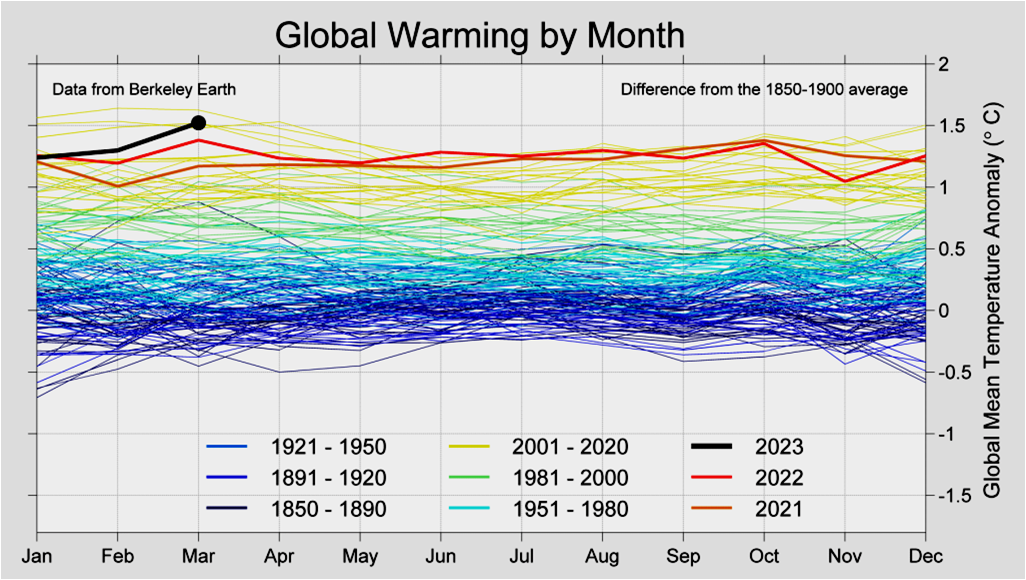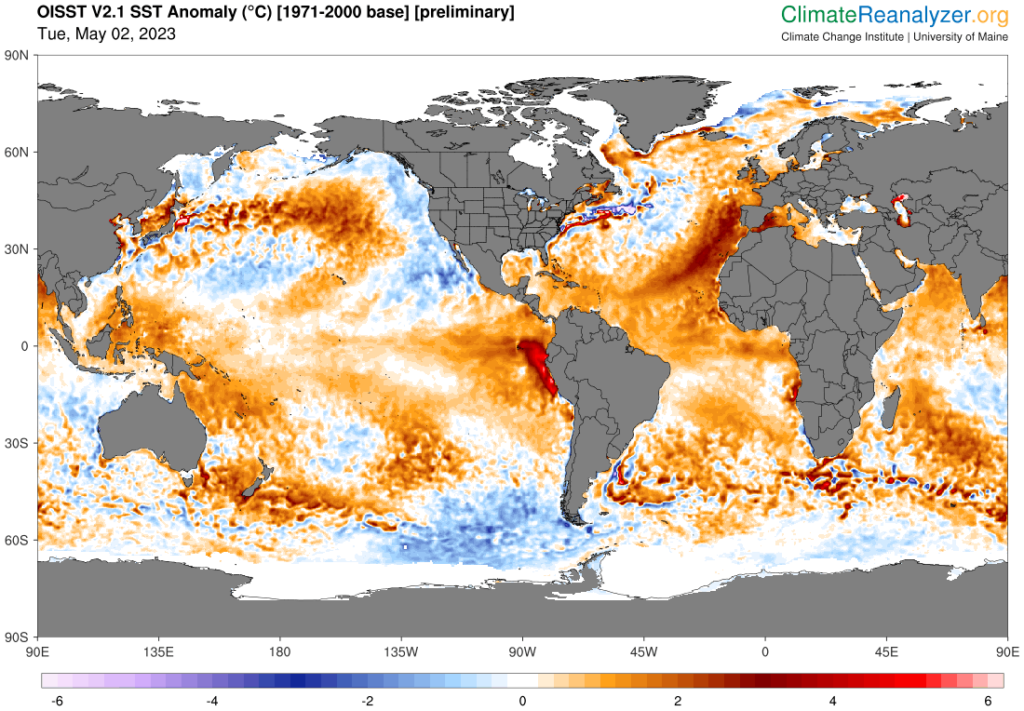Ominous climate crisis trends for 2023 onward

Berkeley Earth shows March 2023 was abruptly warmer than February and tied for the 2nd warmest March globally since records began in 1850.
Berkeley Earth’s global temperature readings are ominous news where the climate crisis is concerned.
Berkeley Earth is an independent climatology research organization established in 2010 to systematically address five major concerns that global warming skeptics had identified, and did so in a systematic and objective manner. The first four were potential biases from data selection, data adjustment, poor station quality, and the urban heat island effect. Their analysis showed that these issues did not unduly bias the record. The fifth concern related to the over-reliance on large and complex global climate models by the Intergovernmental Panel on Climate Change (IPCC) in the attribution of the recent temperature increase to anthropogenic forces. They obtained a long and accurate record, spanning 250 years and showed that it could be well-fit with a simple model that included a volcanic term and, as an anthropogenic proxy, CO2 concentration.
Berkely Earth has several major objectives for their continuing work:
- Further scientific investigations on the nature of climate change.
- Continued identification, investigation, and illustration of opportunities for applications of our global temperature dataset and air pollution data, and work with global industries and governments to inform and support immediate and long-term decision-making on global warming.
- Continue as the world leader in the collection, analysis, and presentation of world air quality information.
- Establish and strengthen partnerships with national and international media, NGOs, industry leaders, government decision-makers to explore and promote ways to communicate and utilize our data.
- Increase the collection, analysis, and presentation of ocean data.
The climate science community accepts Berkeley Earth’s independently constructed reports among the standards used for cross-checking the accuracy of other reports (i.e., as independent observations of what should be the same reality).

March 2023 Temperature Update
Robert Rohde – 12/04/2023, Berkeley Earth
The following is a summary of global temperature conditions in Berkeley Earth’s analysis of March 2023.
Read the complete article….
- Globally, March 2023 was abruptly warmer than February and tied for the 2nd warmest March since records began in 1850.
- March global average temperatures exceeded 1.5 °C (2.7 °F) above the 1850 to 1900 baseline, becoming the 10th time this has occurred for a monthly average.
- On land, March 2023 was the 2nd warmest March since 1850.
- Warm conditions occurred in much of Asia, parts of Europe and North Africa, the Arctic, southern South America, and several oceanic regions.
- Unusually cool conditions were present in parts of the Western United States and Canada, as well as much of the Southern Pacific.
- The Pacific exhibits neutral conditions with a transition to El Niño considered likely later this year.
- 2023 is on pace to be the 2nd, 3rd, or 4th warmest year, but considerable uncertainty remains, including a substantial 38% likelihood that 2023 could become a new record warm year.
The global heat rise in March and April is more than reflected in the average sea-surface temperature (SST) anomaly over most of the Earth outside the polar regions not included in the following measurements depicted by the University of Maine’s ClimateReanalyzer.org, whose supercomputers reconstruct and record a wide range of climate observations from many thousands to millions of data points for the planet every day. Even as the SST is falling significantly at the end of April after reaching an all-time record, it is still way higher than any previous record for this time of the year.
Some idea of the quality and magnitude of the input data can be found by following the links below the graphics in this document.

Current sea surface temperatures also indicate the likelihood that the next El Niño is brewing that will drive global average (and many local) temperatures to new record highs.

We can conclude from these observations, that there is no evidence that the process of global warming has stopped or even slowed. If we don’t stop it soon, humans – and for that matter – all life on Earth will suffer from the failure. Political as well as personal action is required if we are to give our offspring a viable future.
Featured Image
Berkeley Earth’s plot of Global Warming by Month through the end of February 2023: “The most significant spatial features of year-to-date temperatures are the end of La Niña, warmth across much of the northern mid-latitudes, and several ocean hotspots. Year-to-date, 3.9% of the Earth’s surface has experienced average temperatures that are a local record high. In addition, 0.01% of the surface has been record cold year-to-date.” https://berkeleyearth.org/march-2023-temperature-update/.